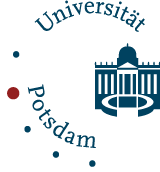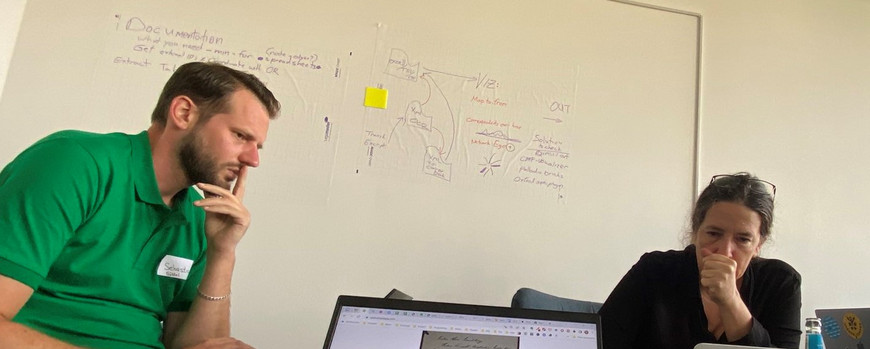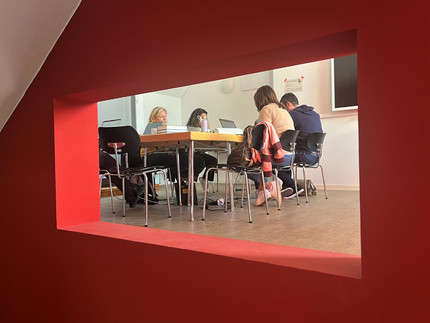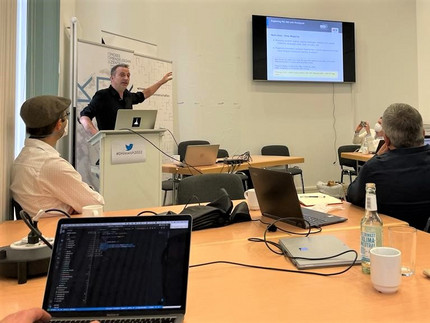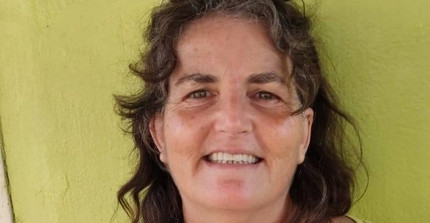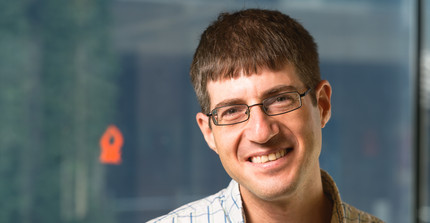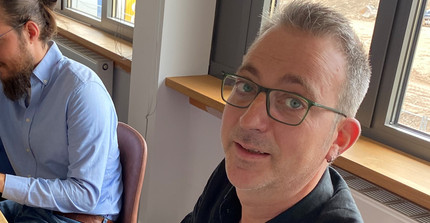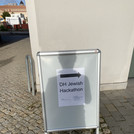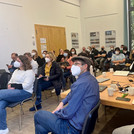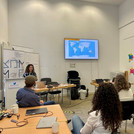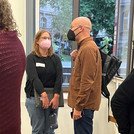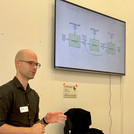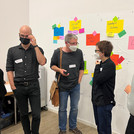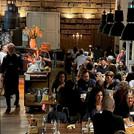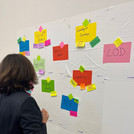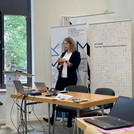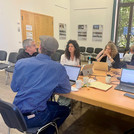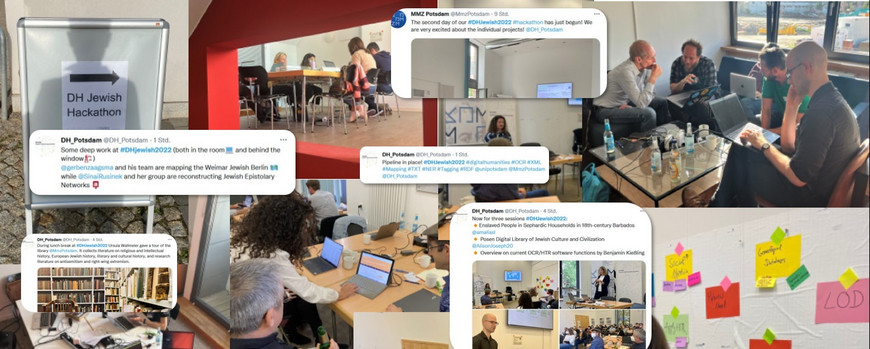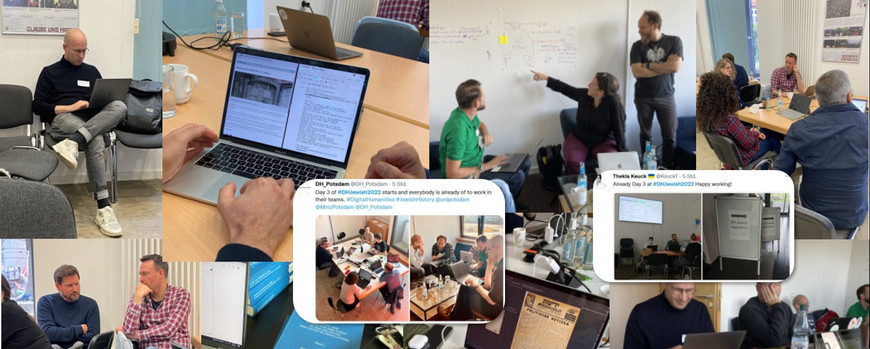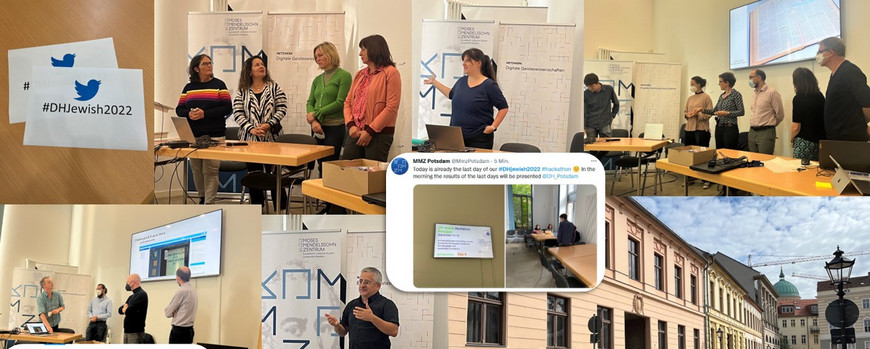DH Jewish Hackathon, 15-18 September 2022
What? A collaborative event on challenges and research perspectives in Digital Jewish Heritage
Where? Zentrum für Zeithistorische Forschung, Am Neuen Markt 9d, 14467 Potsdam
When? Start: 5 p.m. of September 15, 2022 | End: 12.30 p.m. of September 18, 2022
Who? Potsdam Network for Digital Humanities, in cooperation with Moses Mendelssohn Center for European-Jewish Studies and the Fellows Yael Netzer, Itay Marienberg-Milikowsky, Gerben Zaagsma
Funded by the Henriette Herz Prize by the Alexander von Humboldt Foundation
The digitization of Jewish Cultural Heritage poses new challenges yet creates new opportunities for both institutions and scholars concerned with cultural memory. In this dynamic phase of digital transformation, it is all the more essential to foster open exchange between projects and scholars from the (digital) humanities as well as from computer science. The present “DH Jewish” event is thus conceived as an opportunity that combine this open exchange with collaborative experimentation and prototyping. In pre-established or spontaneously formed teams, participants will – depending on their own interests and expertise – explore little-known datasets, venture on new research questions, experiment with ways of modeling or with novel analytical methods.
The primary aim of this Hackathon, as we understand it, is to create a shared open space in which the participants take time to discuss and experimentally explore topics at the intersection of Digital Humanities and Jewish Studies. Therefore, it is not a question of producing finished results or presenting final products, but of jointly exploring possible paths, developing prototypes, discovering spaces of practice.
Accordingly, our Hackathon involves two formats: Challenges and Sessions.
Organizers
Potsdam Network for Digital Humanities
Anna Busch, Daniil Skorinkin, Peer Trilcke
Moses Mendelssohn Center for European-Jewish Studies
Daniel Burckhardt, Miriam Rürup, Nina Zellerhoff
Mail: digital-humanitiesuuni-potsdampde
Twitter: https://twitter.com/DH_Potsdam #DHJewish2022
A Challenge is a task to be approached in teams (but in particular cases also individually) during the entire Hackathon. Challenges can be the development of software prototypes, the execution of digital analyses, the processing (cleaning, enrichment, etc.) of a data set, the design of a data model, the discussion of standards or ontologies, the testing of new workflows and much more. Participants faced with a challenge are usually asked to produce a specific outcome by the end of the Hackathon (a poster, a website, a piece of software, a dataset, a concept paper, etc.). Challenges can be submitted to the organizers before the Hackathon and will then be presented on this website. Together with spontaneous ideas, these challenges will be pitched at the beginning of the Hackathon, after which teams will be formed to work on selected challenges during the Hackathon. Everyone is welcome to propose Challenges (see below for information on the procedure).
A Session is an input-and-discussion panel of about 20 to 30 minutes in length. Sessions are spread over the course of the Hackathon and intended to open up spaces of thought and practice, to provide intellectual inspiration and to encourage exchange. A session can be, for example, a short presentation of a data set, a platform, a software, a method, a hypothesis, a research question, or even the (preliminary) results of a research project in progress. It is important that a session offers an impulse that stimulates discussion. Usually, the presentation should not last longer than 10 minutes. Sessions can also be submitted to the organizers before the Hackathon (and will then be presented here on the website). At the beginning of the Hackathon, all participants will collaborate on a schedule based on these pre-submitted session ideas and spontaneous proposals. On each day of the Hackathon day, there will be a slot of 60 to 90 minutes for sessions. Everyone is welcome to propose sessions (see below for information on the procedure).
The Potsdam DH Jewish Hackathon 2022 is organized together with these three international fellows:
| Thu, Sept. 15th | Fri, Sept. 16th | Sat, Sept. 17th | Sun, Sept. 18th | |
| 9 a.m. - 12:30 p.m. | Hackathon | Hackathon | Presentations, Discussions & Closing. | |
| 12:30 p.m. - 1:30 p.m. | Lunch (at the venue) | Lunch (at the venue) | Get Together (Restaurant in the city centre) | |
| 1:30 p.m. - 3:00 p.m. | Sessions | Sessions | ||
| Afternoon | 5 p.m. Opening & Pitches | Hackathon | Hackathon | |
| Evening | 7. p.m. Get Together (Restaurant in the city centre) | Open end | Open end |
| A Jewish Republic of Letters | Sinai Rusinek |
| Development of a Database for the Hebrew Novel from 1853 to the Present | Itay Marienberg-Milikowsky |
| Matching German Jewish Biographies | Daniel Burckhardt |
| How to link DH Jewish projects. A dummy guide to LOD | Thomas Kollatz |
| Jewish-related Archive Catalogues | Yael Netzer |
| Mapping Weimar Yiddish Berlin | Gerben Zaagsma |
| Modeling a database of Jewish cemeteries in Brandenburg | Ingo Börner, Peer Trilcke |
| Prototyping (and evaluating) a pipeline for Named Entity Recognition in "Mitteilungsblatt" | Daniil Skorinkin |
| (Social) Media Reporting | Anna Busch |
| Intersecting Networks: The Community of Enslaved People in Sephardic Households in 18th-century Barbados | Amalia Levi |
| Diachronic Mapping in the Posen Digital Library of Jewish Culture and Civilization | Alison Joseph |
| Overview on how current OCR/HTR software functions | Benjamin Kiessling |
| Mapping Wartime Jewish Diaries | Gerben Zaagsma |
| Atlas of Holocaust Literature - Warsaw Ghetto | Konrad Niciński |
| DraCor. Drama Corpora Plattform | Ingo Börner, Peer Trilcke, Daniil Skorinkin |
| Name | Institution | |
| 1 | Ingo Börner | Universität Potsdam |
| 2 | Daniel Burckhardt | Moses Mendelssohn Zentrum für europäisch-jüdische Studien Potsdam |
| 3 | Anna Busch | Theodor-Fontane-Archiv, Universität Potsdam |
| 4 | Aaron Christianson | Goethe Universität / UB Frankfurt |
| 5 | Yael Dekel | Ben Gurion University of the Negev, Literary Lab |
| 6 | Avigail Friedland | University of Amsterdam |
| 7 | Sebastian Göttel | Berlin-Brandenburgische Akademie der Wissenschaften |
| 8 | Dror Guldin | |
| 9 | Elena Hamidy | University of Giessen |
| 10 | Gilad A Jacobson | Shalem College of Liberal Arts, Jerusalem |
| 11 | Alison Joseph | Posen Digital Library of Jewish Culture and Civilization |
| 12 | Jonathan Kaplan | Goethe Universität / UB Frankfurt |
| 13 | Thekla Keuck | Universität Bremen |
| 14 | Benjamin Kiessling | École Pratique des Hautes Études (EPHE) part of PSL-University, Paris |
| 15 | Imme Klages | Johannes Gutenberg-Universität Mainz |
| 16 | Aenne Knierim | Universität Regensburg |
| 17 | Thomas Kollatz | Digitale Akademie der Akademie der Wissenschaften und Literatur, Mainz |
| 18 | Juliane Kraske | Deutsches Zentrum Kulturgutverluste |
| 19 | Amalia S. Levi | University of Bonn |
| 20 | Felix Lohmann | FH Potsdam |
| 21 | Harald Lordick | Salomon Ludwig Steinheim-Institut für deutsch-jüdische Geschichte an der Universität Duisburg-Essen |
| 22 | Itay Marienberg-Milikowsky | Ben-Gurion University of the Negev |
| 23 | Carsten Milling | Universität Potsdam |
| 24 | Yael Netzer | Hebrew University, Haifa University, Dicta, Ben Gurion University, Tel Aviv University |
| 25 | Konrad Niciński | Polish Academy of Sciences |
| 26 | Lisa Pribik | Leibniz-Institut für jüdische Geschichte und Kultur Simon Dubnow |
| 27 | Miriam Ruerup | Moses Mendelssohn Zentrum für europäisch-jüdische Studien Potsdam |
| 28 | Sinai Rusinek | University of Haifa |
| 29 | Benjamin Schnabel | Hochschule der Medien, Stuttgart |
| 30 | Gil Shalit | |
| 31 | Daniil Skorinkin | Universität Potsdam |
| 32 | Henny Sluyter-Gäthje | Universität Potsdam |
| 33 | Jan-Erik Stange | Freie Universität Berlin |
| 34 | Peer Trilcke | Theodor-Fontane-Archiv, Universität Potsdam |
| 35 | Ursula Wallmeier | Theodor-Fontane-Archiv, Universität Potsdam / Moses Mendelssohn Zentrum für europäisch-jüdische Studien Potsdam |
| 36 | Sabrina Werner | Deutsches Zentrum Kulturgutverluste |
| 37 | Gerben Zaagsma | University of Luxemburg |
| 38 | Nina Zellerhoff | Moses Mendelssohn Zentrum für europäisch-jüdische Studien Potsdam |
